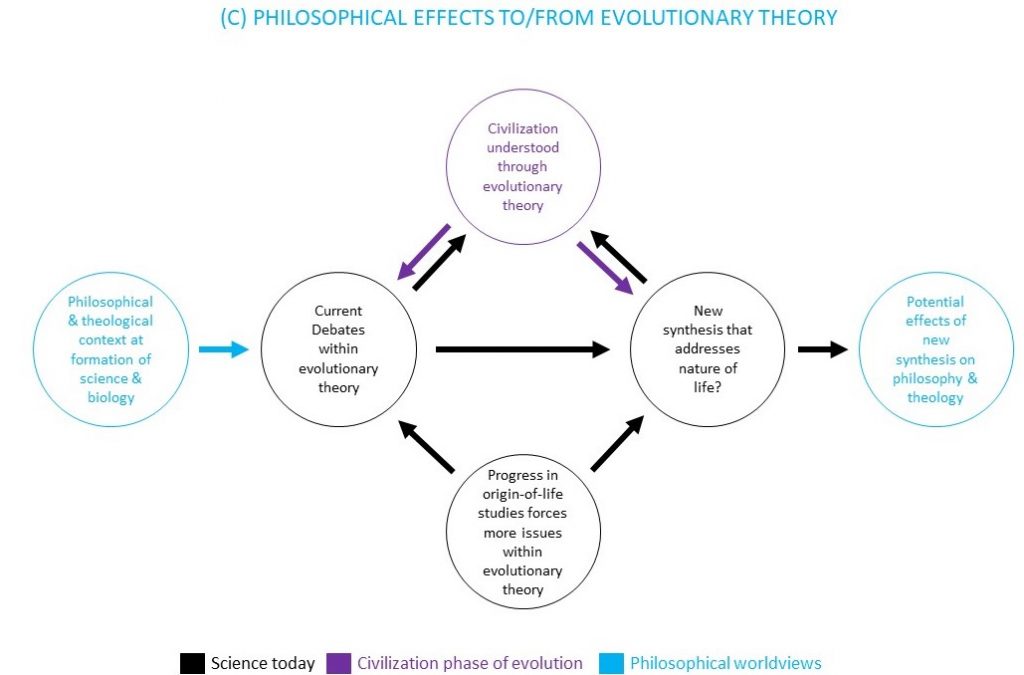Questions
Are there existing philosophical and theological assumptions behind evolutionary theory that are questionable? Will any new synthesis of evolutionary theory affect our philosophical and theological worldviews?
Background
When we discuss a potential new evolutionary synthesis (forum A) and especially an exploration of the evolutionary character of civilization (forum B), we must keep in mind our assumptions that stem from philosophy and theology and the repercussions our dialogue may have on them. Science and evolutionary theory were born within philosophical currents, are carried out today within philosophical assumptions, and could cause significant changes in how we understand ourselves and ultimate meaning or god if there is a new evolutionary synthesis. Forum (C) reviews the key philosophical factors and their changes and how they have supported certain assumptions within evolution and biology since their founding as well as how the possibilities for breakthroughs in evolutionary theory (A) or (B) could affect our understanding of ourselves and ultimate meaning, or god.
Example Assumptions
Aristotle, reportedly the first biologist, explored individual organisms and the question about the nature of life in its wholeness. At its outset, biology put aside the second question in order to investigate particular organisms (Grene & Depew 2004; Thacker 2010). A missing conception of the nature of life remains a yawning gap (Turner 2017). Likewise, the evolutionary preference for organisms over ecosystems and the biosphere remains an assumption that is now in dispute (Smith & Morowitz 2016).
Since early biology, the focus has turned to the mechanics of organisms while imputing the ultimate organization to god or final cause. Since then our chemical and mechanical understanding have advanced so much as to not need these larger covering principles. The bad side effect, however, is that biological thought is stuck with a view of matter as passive with only special sources of agency such as genes or humans (Riskin 2016).
As mentioned in forum (B), our conception of ourselves as special has likely contributed to our current position within evolutionary theory where backward compatibility to apes took awhile to absorb while the forward compatibility to who we are within the novel dynamics of civilization and the modern world has been left to our presumed specialness.
Example Potential Consequences
Following from forums (A) and (B) and if there is a significantly extended new synthesis, there is a strong case to be made that evolution carries qualities that have historically been attributed to god. Living processes that are continuous between non-life and life have the same structure as process theologies and philosophies (Ulanowicz 2016).
If civilization is shown to be a transitionary period of evolutionary change, and if a dynamics such as economics is seen to be among its parameters, then headstrong views of ourselves as business masters of the universe will shift toward not just our roles within ecologies but toward our roles in the growth of the biosphere.
An ongoing major evolutionary transition for humans gives a philosophical conception of the human as entrained in dynamics (e.g., consensuality, economics, coevolution with domesticates) above the level of the previous self-sufficient and all-knowing agent. And human fates that are within the larger process that is evolution have the same structure as participation in a creative process divinity.
The third forum (C) is shown in the graph below that builds on the graphs illustrating forums (A) and (B). The effects of assumptions since the founding of biology and science are diagrammed in the blue circle at the far left while the potential consequences from changes in the evolutionary synthesis (A) or from an evolutionary understanding of civilization (B) are shown in the blue circle at the far right. Again, this is an invitation to dialogue and to keep a wide focus in working on Themes (A) and (B).

References
Grene, Marjorie & D. Depew. 2004. The Philosophy of Biology: An Episodic History. Cambridge University Press. p. 39.
Riskin, Jessica. 2016. The Restless Clock: A History of the Centuries-Long Argument over What Makes Living Things Tick. University of Chicago Press.
Smith, Eric & H. Morowitz. 2016. The Origin and Nature of Life on Earth: The Emergence of the Fourth Geosphere. Cambridge University Press.
Thacker, Eugene. 2010. After Life. University of Chicago Press. pp. 6-22.
Turner, J. Scott. 2017. Purpose and Desire: What Makes Something ‘Alive’ and Why Modern Darwinism has Failed to Explain It. New York: HarperOne.
Ulanowicz, Robert. 2016. “Process Ecology: Making Room for Creation.” SOPHIA. 55:357-380.